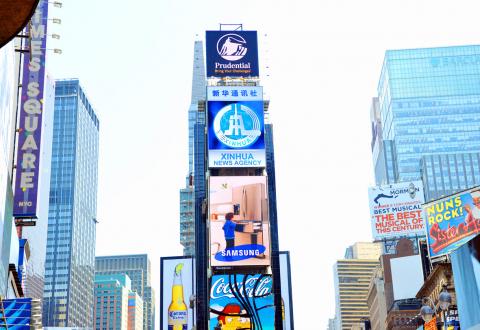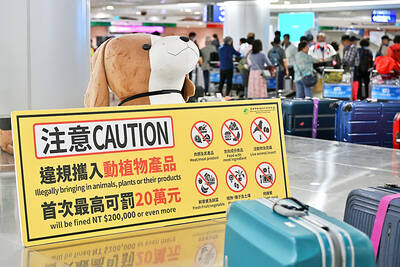US President Donald Trump’s administration has ordered four Chinese state-owned news outlets to slash the number of staff they have working in the US, part of a broader response to Beijing’s restrictions on US journalists, including its expulsion of three Wall Street Journal reporters last month.
The move risks further tit-for-tat measures from Beijing, as the world’s biggest economies continue a broader battle for global influence.
From Friday next week, the four outlets will be allowed to employ a combined total of 100 Chinese citizens in the US, down about 40 percent from now, two US Department of State officials told reporters on Monday on condition of anonymity.

Photo: AFP
The officials said the reductions were not expulsions, although about 60 employees would almost certainly need to leave the country.
“Unlike foreign media organizations in China, these entities are not independent news organizations,” US Secretary of State Michael Pompeo said in a statement after the officials briefed reporters. “As we have done in other areas of the US-China relationship, we seek to establish a long-overdue level playing field.”
The outlets affected by the move are Xinhua news agency, China Global Television Network, China Radio International and China Daily Distribution Corp. A fifth, Hai Tian Development USA, is also included under the cap, but will not have to cut staff because it has only two Chinese employees on its payroll in the US.
The restrictions stem from an effort by the Trump administration to restore what officials call reciprocity between the way China and the US treat each other’s journalists.
China currently allows about 100 US citizens in the country and has severely restricted the number of visas it issues to foreign reporters.
More restrictions are likely to come soon.
Another senior US administration official, also briefing reporters ahead of Pompeo’s statement, said that the US plans to limit how long Chinese citizens are allowed to stay in the country on journalist visas.
That would match a Chinese requirement restricting foreign reporters to as little as 30 days before they must seek an extension.
China yesterday condemned the move, saying Chinese journalists have a “universally recognized professional reputation.”
“Out of a Cold War mindset the US is conducting political oppression on Chinese media agencies in the US,” Chinese Ministry of Foreign Affairs spokesman Zhao Lijian (趙立堅) told reporters in Beijing. “We urge the US to correct its mistake at once and we reserve the right to take further actions.”
He said the move exposes the “hypocrisy of the United States’ so-called freedom of the press as blatant double standard and hegemonic bullying.”
Saying China reserves the right to react and take further action, Zhao added: “It was the US who broke the rules of the game first, China can only follow suit.”
Washington began mulling expulsions in earnest after China last month ordered the departure of the three Wall Street Journalreporters — two Americans and an Australian — after saying the outlet had refused to apologize for a “racially discriminatory” headline on an op-ed piece.
US officials have also said the reporters were expelled because of the Journal’s coverage of a Chinese government crackdown on Uighur Muslims in the Xinjiang region.
The Journal has defended its reporters and, like most US outlets, said it operates with a strict separation between its news and opinion staffs. The op-ed piece in question referred to China as “the real sick man of Asia.”
Additional reporting by AFP

UKRAINE, NVIDIA: The US leader said the subject of Russia’s war had come up ‘very strongly,’ while Jenson Huang was hoping that the conversation was good Chinese President Xi Jinping (習近平) and US President Donald Trump had differing takes following their meeting in Busan, South Korea, yesterday. Xi said that the two sides should complete follow-up work as soon as possible to deliver tangible results that would provide “peace of mind” to China, the US and the rest of the world, while Trump hailed the “great success” of the talks. The two discussed trade, including a deal to reduce tariffs slapped on China for its role in the fentanyl trade, as well as cooperation in ending the war in Ukraine, among other issues, but they did not mention

Japanese Prime Minister Sanae Takaichi yesterday lavished US President Donald Trump with praise and vows of a “golden age” of ties on his visit to Tokyo, before inking a deal with Washington aimed at securing critical minerals. Takaichi — Japan’s first female prime minister — pulled out all the stops for Trump in her opening test on the international stage and even announced that she would nominate him for a Nobel Peace Prize, the White House said. Trump has become increasingly focused on the Nobel since his return to power in January and claims to have ended several conflicts around the world,

REASSURANCE: The US said Taiwan’s interests would not be harmed during the talk and that it remains steadfast in its support for the nation, the foreign minister said US President Donald Trump on Friday said he would bring up Taiwan with Chinese President Xi Jinping (習近平) during a meeting on the sidelines of the APEC Summit in South Korea this week. “I will be talking about Taiwan [with Xi],” Trump told reporters before he departed for his trip to Asia, adding that he had “a lot of respect for Taiwan.” “We have a lot to talk about with President Xi, and he has a lot to talk about with us. I think we’ll have a good meeting,” Trump said. Taiwan has long been a contentious issue between the US and China.

Taiwan’s first African swine fever (ASF) case has been confirmed and would soon be reported to the World Organization for Animal Health (WOAH), Minister of Agriculture Chen Junne-jih (陳駿季) yesterday. The Ministry of Agriculture’s Veterinary Research Institute yesterday completed the analysis of samples collected on Tuesday from dead pigs at a hog farm in Taichung and found they were ASF-positive. Animal and Plant Health Inspection Agency Animal Quarantine Division chief Lin Nien-nung (林念農) said the result would be reported to the WOAH and Taiwan’s major trade partners would also be notified, adding that pork exports would be suspended. As of Friday, all samples